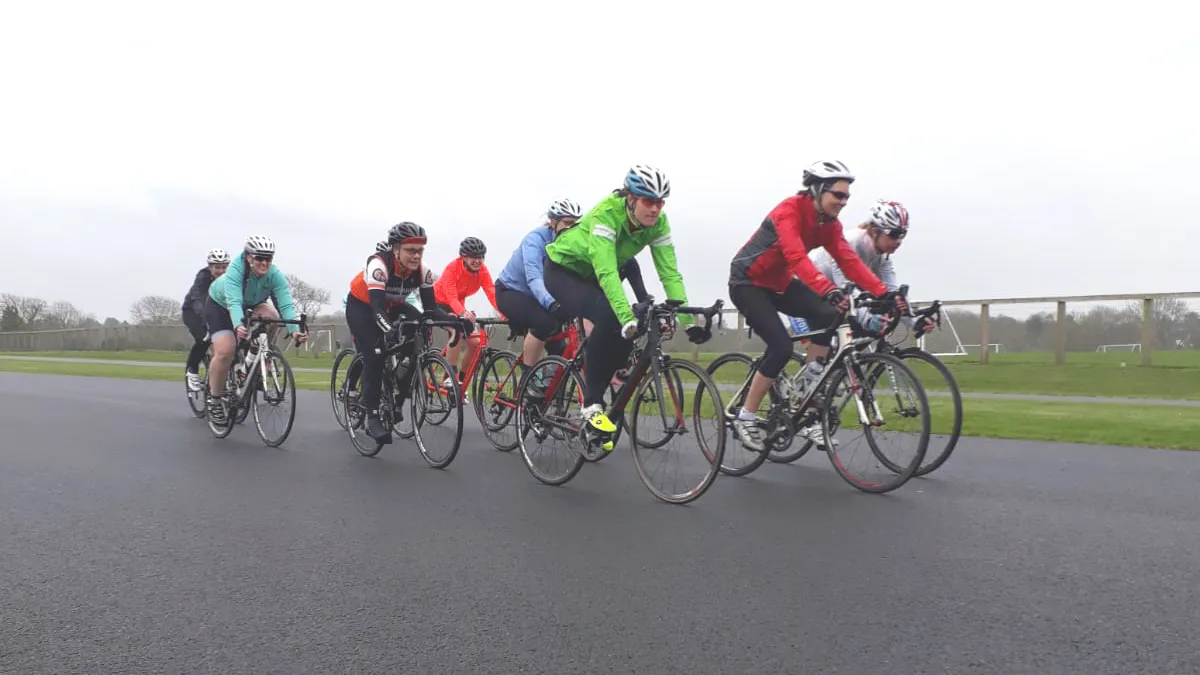Pro riders and their teams have meticulous planning processes in place. They arrive in plenty of time, have all the kit required, know the right levels of hydration and nutrition, can carry out a reliable, well-executed warm up and have a tool kit of mental skills to dip into. These factors, built into routines, puts them in charge of the things they can control.
Being in control helps you get into the right mindset for racing, with enough nerves to feel excited about the race but not so many that you have a tummy full of fear and are on your third trip to the toilet with an hour still to go!

What's going on in your body and mind
That feeling of having too many nerves is a result of caring about what we are about to do (great) and because we feel out of control (not so great).
When we have both, instead of being excited about the race, our brains interpret the feeling as a threat. We get sweaty hands, a raised heart rate, a flood of adrenaline and cortisol, and a body that wishes to empty itself out to facilitate escape at any moment – hence why you spend a lot of time standing in toilet queues.
I'd start to enter a serene sense of calm and the nerves would just go while I waited for the starting gun
Sally Bigham, MTB marathon champion and coach
These physical responses are handy if we are under real physical threat, but annoying when it is only a perceived, more ego-driven threat we are facing.
Dampening down how much we care can be difficult — we are better off trying to feel more in control. Preparing like a pro gives us this control, so we see the race ahead as an exciting challenge rather than a stomach-churning threat and to do this, we need a pre-performance routine.
The importance of a pre-performance routine
A pre-performance routine means your attention stays in the present and only on elements that are task-relevant. It helps reduce anxiety, gets you to your optimal level of nerves, and improves concentration, focus and performance.
The routine gets you ready to compete, feeling comfortable you have done everything possible to reach the start line with the best preparation. The more you repeat and practise the routine, the more beneficial it is.

Create your own
A pre-performance routine works when it's truly yours, so you need to design it around your personality, your cycling event and your preparation preferences.
Consider how long you want your routine to cover; some like 24 hours (for a big race) others less than an hour (for regular competitions).
With a meticulous plan you can prep like a pro, and often perform like one too
Consider each element of your preparation and build it into your plan with a realistic time allocation:
- Training beforehand A training plan that builds towards a race, including time to rest/taper ahead of the race
- Kit and equipment Your bike has been checked over and is in perfect race conditions, all your kit is laid out or packed
- Travel and logistics Your travel to the event has been planned, including extra time in case of delays, plus enough time for set-up and preparation on-site
- Race tactics You’ve thought ahead about how you’re going to approach the race and what you're aiming to achieve
- Food: A plan for pre-, during and post-race nutrition, which is tried and tested
- Warm up A sequence or warm-up that has been pre-prepared, is tailored to your needs and has been practised
- Mental skills A set of techniques or practices that help get you into the right mindset. This could be imagery, positive self-talk or deep breathing techniques.
- Music A music playlist that helps you focus or relax helps some riders
The pro example — Sally Bigham, MTB marathon champion and coach

Sally Bigham has recently retired from professional mountain-bike riding ,having spent ten years riding for Topeak-Ergon Racing Team.
She has won the British Marathon Championships six times, been European MTB Marathon Champion and is a triple winner of the Leadville 100, and now runs a coaching business.
When she raced she was a stickler for a good pre-performance routine and broke the three hours before racing down into the following;
Sally Bigham's schedule for race morning
Three hours to go: "Breakfast of porridge made with water topped with a banana and honey, and a black coffee. I'd then sit on my hotel bed and listen to music while looking through and rechecking the race stats, maps, logistics and nutrition. I'd visualise myself riding the technical sections perfectly and visualise putting my race tactics into practice. For particularly important races I'd work through deep-breathing techniques to help relax."
One hour to go: "I'd start my warm-up routine (always the same), while listening to a warm-up playlist. After changing into dry clothes, I'd go to the loo and get to the box 15 minutes before the start."
Ten minutes to go: "With 10 minutes to go I'd take a carbohydrate gel."
Five minutes to go: "I start shaking my quad muscles with my hands (a habit) and checking the fastenings on my shoes (another habit) and (more than likely) standing on my tiptoes while tapping them on the ground (a weird habit!)."
On the start line: "I'd start to enter a sense of calm and the nerves would just go while I waited for the starting gun."
As Bigham shows, with a meticulous plan that's practised regularly, and with every element covered, you can prep like a pro and often perform like one too.